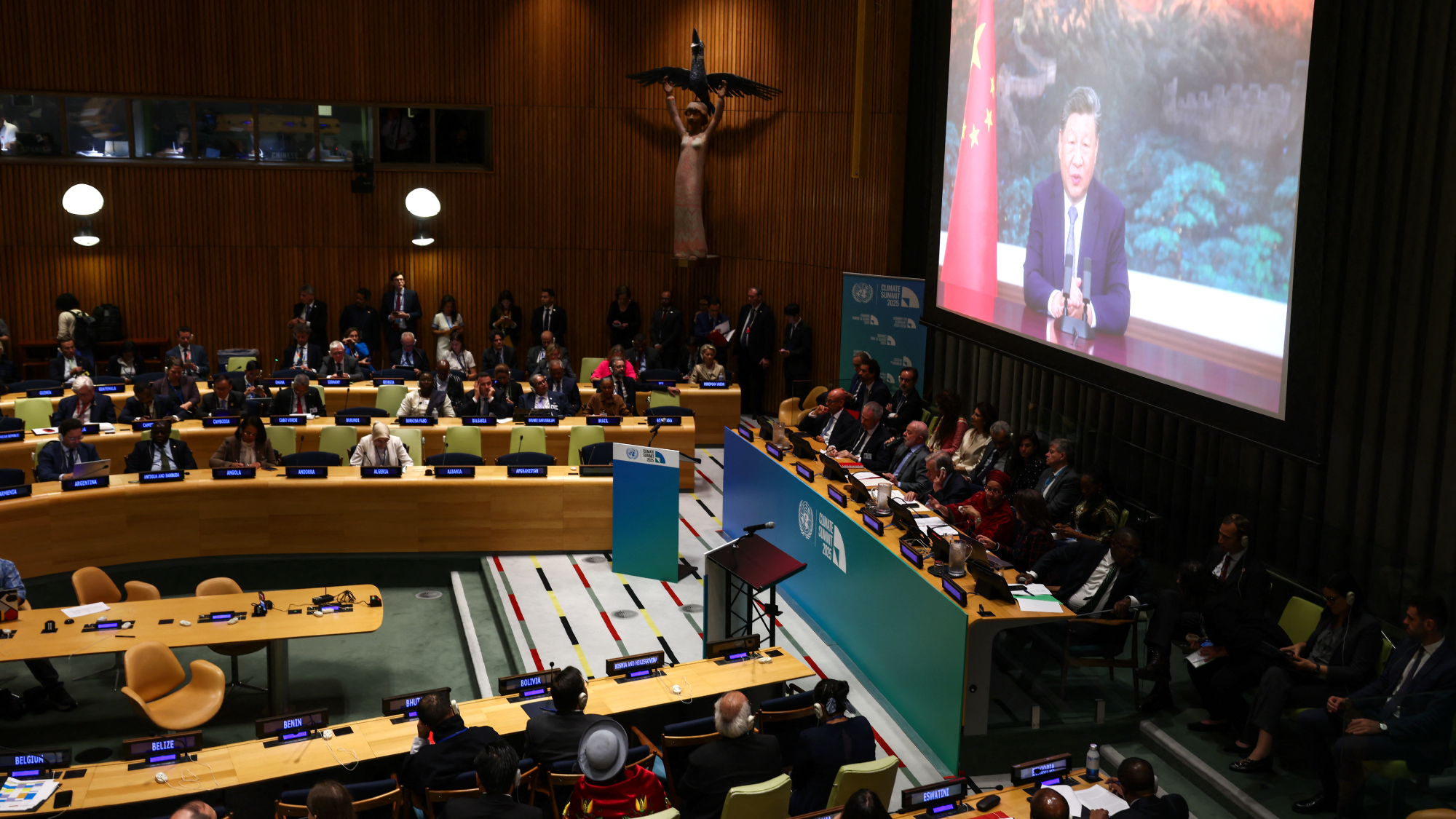China vows first emissions cut, sidelining US
The US, the world’s No. 2 emitter, did not attend the New York summit


A free daily email with the biggest news stories of the day – and the best features from TheWeek.com
You are now subscribed
Your newsletter sign-up was successful
What happened
Chinese President Xi Jinping Wednesday told a United Nations climate summit that his country would reduce its greenhouse gas emissions by between 7% and 10% over the next 10 years and ramp up its solar and wind energy capacity so that renewables account for more than 30% of domestic energy consumption. It was Beijing’s first commitment to cut emissions, though climate experts called it an insufficient target from the world’s largest producer of heat-trapping gases. The U.S., the world’s No. 2 emitter, did not attend the New York summit.
Who said what
“Green and low-carbon transition is the trend of our time,” Xi said via video. “While some countries are acting against it, the international community should stay focused in the right direction.” That was a “veiled rebuke” of President Donald Trump, Reuters said. The U.S. president told fellow world leaders on Tuesday that “windmills are pathetic,” climate change is a “con job” and if they “don’t get away from the green energy scam, your country is going to fail.”
China burns more coal than any other country but has also “emerged as the dominant manufacturer of clean-energy technologies,” The Wall Street Journal said. “Trump wants fossil fuels,” political scientist Ian Bremmer said to Reuters, “but letting China become the world’s sole powerful electro-state is the opposite of making America great again.”
What next?
China’s pledge could give a moderate boost to the U.N.’s COP30 climate negotiations in Brazil in November. “The U.S. going AWOL has lowered the bar for what will count as ambitious enough to qualify as sufficient,” energy analyst Lauri Myllyvirta told The Washington Post.
The Week
Escape your echo chamber. Get the facts behind the news, plus analysis from multiple perspectives.

Sign up for The Week's Free Newsletters
From our morning news briefing to a weekly Good News Newsletter, get the best of The Week delivered directly to your inbox.
From our morning news briefing to a weekly Good News Newsletter, get the best of The Week delivered directly to your inbox.
A free daily email with the biggest news stories of the day – and the best features from TheWeek.com
Peter has worked as a news and culture writer and editor at The Week since the site's launch in 2008. He covers politics, world affairs, religion and cultural currents. His journalism career began as a copy editor at a financial newswire and has included editorial positions at The New York Times Magazine, Facts on File, and Oregon State University.
-
 How the FCC’s ‘equal time’ rule works
How the FCC’s ‘equal time’ rule worksIn the Spotlight The law is at the heart of the Colbert-CBS conflict
-
 What is the endgame in the DHS shutdown?
What is the endgame in the DHS shutdown?Today’s Big Question Democrats want to rein in ICE’s immigration crackdown
-
 ‘Poor time management isn’t just an inconvenience’
‘Poor time management isn’t just an inconvenience’Instant Opinion Opinion, comment and editorials of the day
-
 The plan to wall off the ‘Doomsday’ glacier
The plan to wall off the ‘Doomsday’ glacierUnder the Radar Massive barrier could ‘slow the rate of ice loss’ from Thwaites Glacier, whose total collapse would have devastating consequences
-
 Can the UK take any more rain?
Can the UK take any more rain?Today’s Big Question An Atlantic jet stream is ‘stuck’ over British skies, leading to ‘biblical’ downpours and more than 40 consecutive days of rain in some areas
-
 As temperatures rise, US incomes fall
As temperatures rise, US incomes fallUnder the radar Elevated temperatures are capable of affecting the entire economy
-
 The world is entering an ‘era of water bankruptcy’
The world is entering an ‘era of water bankruptcy’The explainer Water might soon be more valuable than gold
-
 Climate change could lead to a reptile ‘sexpocalypse’
Climate change could lead to a reptile ‘sexpocalypse’Under the radar The gender gap has hit the animal kingdom
-
 The former largest iceberg is turning blue. It’s a bad sign.
The former largest iceberg is turning blue. It’s a bad sign.Under the radar It is quickly melting away
-
 How drones detected a deadly threat to Arctic whales
How drones detected a deadly threat to Arctic whalesUnder the radar Monitoring the sea in the air
-
 ‘Jumping genes’: how polar bears are rewiring their DNA to survive the warming Arctic
‘Jumping genes’: how polar bears are rewiring their DNA to survive the warming ArcticUnder the radar The species is adapting to warmer temperatures
